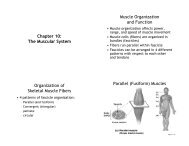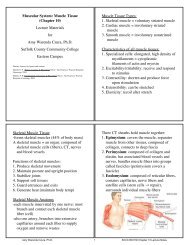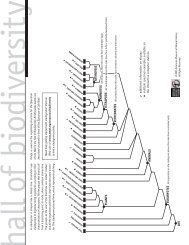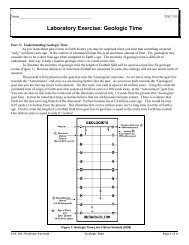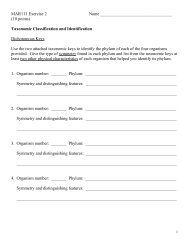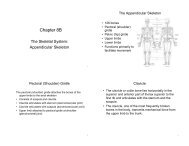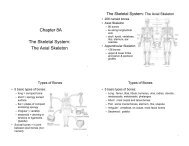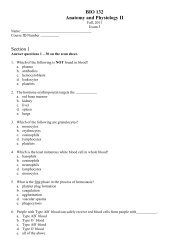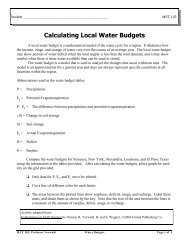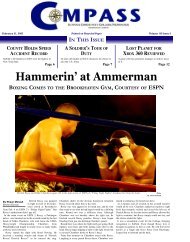Richard J. Gerrig, Ph.D. and Philip Zimbardo, Ph.D.
Richard J. Gerrig, Ph.D. and Philip Zimbardo, Ph.D.
Richard J. Gerrig, Ph.D. and Philip Zimbardo, Ph.D.
Create successful ePaper yourself
Turn your PDF publications into a flip-book with our unique Google optimized e-Paper software.
Underst<strong>and</strong>ing Motivation<br />
Eating<br />
Sexual Behaviors<br />
Motivation for Personal Achievement<br />
Motivation<br />
Chapter 11 Preview<br />
Underst<strong>and</strong>ing Motivation<br />
Starting, directing, <strong>and</strong><br />
maintaining physical <strong>and</strong><br />
psychological activities<br />
Chapter 11<br />
Motivation<br />
1
To relate biology<br />
to behavior<br />
Drives<br />
Underst<strong>and</strong>ing Motivation<br />
To account for<br />
behavioral<br />
variability<br />
• Internal states<br />
that arise in<br />
response to<br />
disequilibrium<br />
To infer private<br />
states from<br />
public acts<br />
Functions of<br />
Motivational<br />
Concepts<br />
To assign<br />
responsibility for<br />
actions<br />
Sources of Motivation<br />
Homeostasis<br />
• Constancy or<br />
equilibrium<br />
<strong>and</strong> balance<br />
Sources of Motivation<br />
Instincts<br />
To explain<br />
perseverance<br />
despite adversity<br />
Incentives<br />
• External<br />
stimuli or<br />
rewards that<br />
motivate<br />
behavior<br />
• Preprogrammed tendencies<br />
essential to species survival<br />
2
Expectations<br />
<strong>and</strong> Cognitive<br />
Approaches<br />
Sources of Motivation<br />
Julian Rotter<br />
Social-learning theory<br />
Fritz Heider<br />
Dispositional forces<br />
Situational forces<br />
Maslow’s Hierarchy of Needs<br />
Maslow’s Hierarchy of Needs<br />
Needs of each level<br />
must be met before next<br />
level can be achieved<br />
Need of each individual<br />
to grow <strong>and</strong> actualize<br />
highest potential<br />
3
Peripheral<br />
Responses<br />
Walter Cannon<br />
Satiety<br />
<strong>Ph</strong>ysiology of Eating<br />
Central<br />
Responses<br />
Lateral<br />
Hypothalamus (LH)<br />
Ventromedial<br />
Hypothalamus<br />
(VMH)<br />
The Psychology of Eating<br />
Cultural<br />
Impact on<br />
Eating<br />
U.S. Government<br />
• Determines “serving size”<br />
• Provides advice on components of<br />
healthy diet<br />
The Psychology of Eating<br />
Predisposal<br />
to Obesity<br />
Genetic evidence<br />
Gene that controls leptin<br />
Influence on regulation<br />
of internal hunger cues<br />
4
Obesity<br />
<strong>and</strong><br />
Dieting<br />
The Psychology of Eating<br />
Body Mass<br />
Index (BMI)<br />
Restrained<br />
vs.<br />
Unrestraine<br />
d Eating<br />
Janet Polivy<br />
<strong>and</strong> Peter<br />
Herman<br />
The Psychology of Eating<br />
Eating<br />
Disorders<br />
<strong>and</strong> Body<br />
Image<br />
Anorexia<br />
Nervosa<br />
Bulimia<br />
Nervosa<br />
Binge Eating<br />
Disorder<br />
Sexual Behaviors<br />
<strong>Ph</strong>eromones<br />
Non-Human<br />
Sexual Behaviors<br />
Estrogen<br />
Androgens<br />
5
Psychology in Your Life<br />
How does the presence of others influence<br />
your eating?<br />
The next time you eat with other people try to<br />
think about how your consumption might<br />
reflect your desire to provide a particular<br />
impression.<br />
Read the information on page 308 of your text<br />
to help formulate your answer.<br />
Sexual Behaviors<br />
Human Sexual Arousal <strong>and</strong> Response<br />
Sexual Arousal<br />
Motivational state of<br />
excitement <strong>and</strong> tension<br />
brought about by<br />
physiological <strong>and</strong> cognitive<br />
reactions to erotic stimuli<br />
Sexual Behaviors<br />
Human Sexual Arousal <strong>and</strong> Response<br />
Masters<br />
<strong>and</strong><br />
Johnson<br />
Excitement<br />
Plateau<br />
Orgasm<br />
Resolution<br />
6
<strong>Ph</strong>ases of Human Sexual Response<br />
Evolution of<br />
Sexual Behaviors<br />
• David Buss<br />
• Parental Investment<br />
Sexual Behaviors<br />
Sexual Norms<br />
• Alfred Kinsey<br />
• Sexual Scripts<br />
• Date Rape<br />
Sexual Behaviors<br />
7
Motivation of Personal Achievement<br />
Need for<br />
Achievement<br />
Henry Murray<br />
• Basic need to<br />
strive for<br />
achievement of<br />
goals<br />
David<br />
McClell<strong>and</strong><br />
• Thematic<br />
Apperception Test<br />
(TAT)<br />
• nAch<br />
Attributions for Success <strong>and</strong> Failure<br />
Attributions<br />
Judgments about causes<br />
of outcomes<br />
Attributions for Success <strong>and</strong> Failure<br />
Locus of<br />
Control<br />
Orientations<br />
• Internal versus<br />
External<br />
• Stability versus<br />
Instability<br />
• Global versus<br />
Specific<br />
8
Attributions Regarding Causes for<br />
Behavioral Outcomes<br />
Attributions for Success <strong>and</strong> Failure<br />
Attributional<br />
Styles<br />
• Martin Seligman<br />
• Explanatory<br />
style<br />
• Optimism versus<br />
Pessimism<br />
Work <strong>and</strong> Organizational Psychology<br />
Organizational Psychologists<br />
• Equity Theory<br />
• Workers are motivated to maintain fair <strong>and</strong> equitable<br />
relationships<br />
• Expectancy Theory<br />
• Workers are motivated when they expect their efforts <strong>and</strong><br />
job performance to result in desired outcomes<br />
9
Recapping Chapter 11 Main Points<br />
Underst<strong>and</strong>ing Motivation<br />
• Functions of Motivational Concepts<br />
• Sources of Motivation<br />
• Hierarchy of Needs<br />
Eating<br />
• <strong>Ph</strong>ysiology of Eating<br />
• Psychology of Eating<br />
Recapping Chapter 11 Main Points<br />
Sexual Behaviors<br />
• Non-Human Sexual Behaviors<br />
• Human Sexual Arousal <strong>and</strong> response<br />
• Evolution of Sexual Behaviors<br />
• Sexual Norms<br />
• Homosexuality<br />
Motivation for Personal Achievement<br />
• Need for Achievement<br />
• Attributions for Success <strong>and</strong> Failure<br />
• Work <strong>and</strong> Organizational Psychology<br />
10



